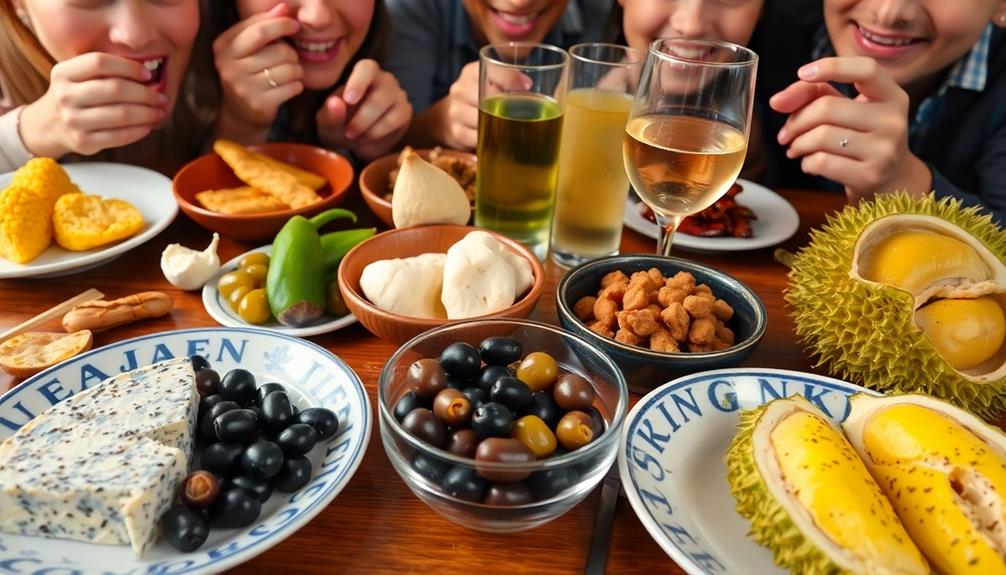The psychology behind competitive eating is a fascinating mix of motivation, emotion, and mental strategies. You'll find that competitors are often driven by the thrill of competition and a desire for recognition. Many train rigorously, using techniques to expand their stomach capacity and enhance efficiency. Amid the excitement, there's also pressure and emotional highs that can lead to anxiety or compulsive eating. These participants may struggle with a complicated relationship with food due to the intense nature of the contests. If you're curious about the impact on health and future trends in this field, you might want to explore further.
Key Takeaways
- Competitive eaters are motivated by the thrill of competition, recognition, and the emotional highs that come from contests.
- Training techniques include practice contests, stomach capacity expansion, and psychological preparation to enhance performance.
- Emotional and physical tolls, such as discomfort and anxiety, are common, requiring coping mechanisms like fasting and channeling nervous energy.
- Societal views glamorize excessive eating, often overshadowing health risks and promoting a communal aspect of eating contests.
- The future of competitive eating may shift towards health awareness, emphasizing balanced diets and health monitoring in competitions.
Understanding Competitive Eating Motivation
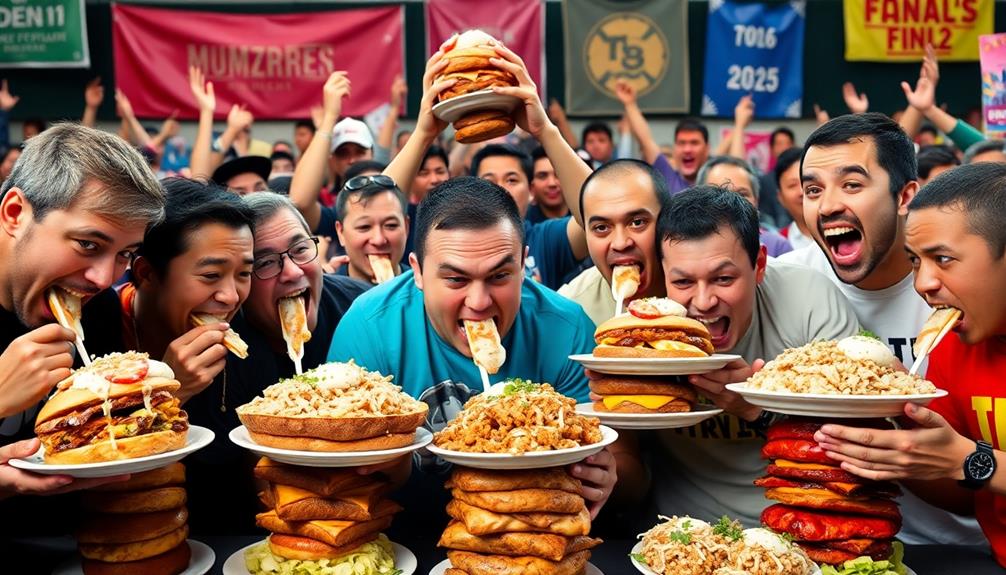
When you explore the psychology behind competitive eating, it becomes clear that motivation plays an essential role in a competitor's success. Competitive eaters thrive on the thrill of competition, pushing themselves to achieve personal bests and records, like Joey Chestnut's astonishing 74 hot dogs consumed in just 10 minutes. This desire for recognition can be powerful, propelling them to new heights.
Additionally, the vibrant culture surrounding food, similar to culinary traditions from around the world, can inspire competitive eaters to explore the diverse flavors and dishes they consume, enhancing their overall experience. Many competitive eaters experience emotional highs during contests, which can create an addictive cycle. The adrenaline rush and crowd stimulation often overshadow any physical discomfort they may feel afterward.
In these high-pressure environments, psychological preparation becomes vital. Elite eaters frequently employ sports psychology techniques to enhance focus and manage nerves, enabling them to perform at their best when it counts.
Societal perceptions also influence motivation in competitive eating. The spectacle of these events can attract attention, and success can lead to fame and sponsorships. This unique subculture offers a sense of belonging that further fuels their drive.
Understanding these motivators reveals the complex interplay of emotions and psychology that underpins competitive eating, ultimately shaping the experience for each competitor.
The Role of Training Techniques
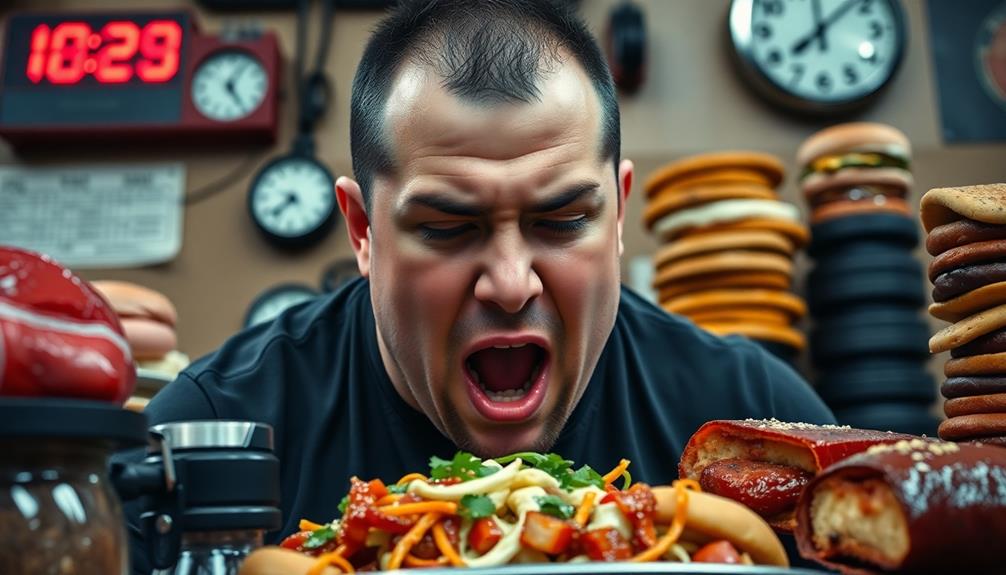
When it comes to competitive eating, training techniques are essential for your success.
You might find yourself practicing contests at home or refining your swallowing methods to maximize efficiency.
Preparing for events can also involve consuming foods like a Loaded Baked Potato to help expand your stomach capacity.
Additionally, psychological preparation plays a key role in building your confidence and mental resilience before competitions.
Training Methods Overview
Training techniques play an essential role in the success of competitive eaters, as they prepare to tackle extreme challenges. You'll often find competitive eaters engaging in practice contests, where they consume large quantities of food—sometimes over 60 hot dogs—to enhance their performance before the real deal.
To maximize their stomach capacity, many utilize fasting and cleansing methods, ensuring they start with an empty competitive eaters stomach. Incorporating nutritious elements, like those found in farm-to-table cooking, can also provide the necessary energy and vitamins needed for rigorous training.
Improving efficiency is key, so they focus on strengthening their jaw muscles and optimizing bite sizes. Video analysis helps refine these techniques, allowing speed eaters to eat more effectively. Some competitors even employ physical strategies like the "jumping up and down" technique, which can help expand their stomach capacity during training sessions.
Additionally, incorporating daily exercise, including running, is essential for enhancing breathing capacity. This aspect is significant for consuming large volumes of food quickly.
With these training techniques, competitive eaters dramatically increase their performance, pushing the limits of what's possible in competitive eating.
Psychological Preparation Strategies
In the world of competitive eating, psychological preparation is as essential as physical training. Competitive eaters, like Joey Chestnut, engage in practice contests that mirror real competition conditions. This strategy helps you refine your techniques and improve performance under pressure.
Similar to how one might savor the rich flavors of Red-Braised Pork Belly during a family gathering, these eaters learn to appreciate the nuances of their craft. Through various training techniques, you analyze videos of your eating style to identify weaknesses, focusing on bite size and jaw strength for maximum efficiency.
Emotional and psychological preparation plays a vital role in this sport. You harness nerves to boost your performance, viewing each challenge as an engineering problem to solve. Some eaters even employ methods like "jumping up and down" to increase stomach capacity, illustrating the blend of physical and psychological strategies.
Developing mental resilience is key; it enables you to cope with discomfort and fatigue during high-calorie competitions, which can be mentally taxing.
Psychological Effects of Competition
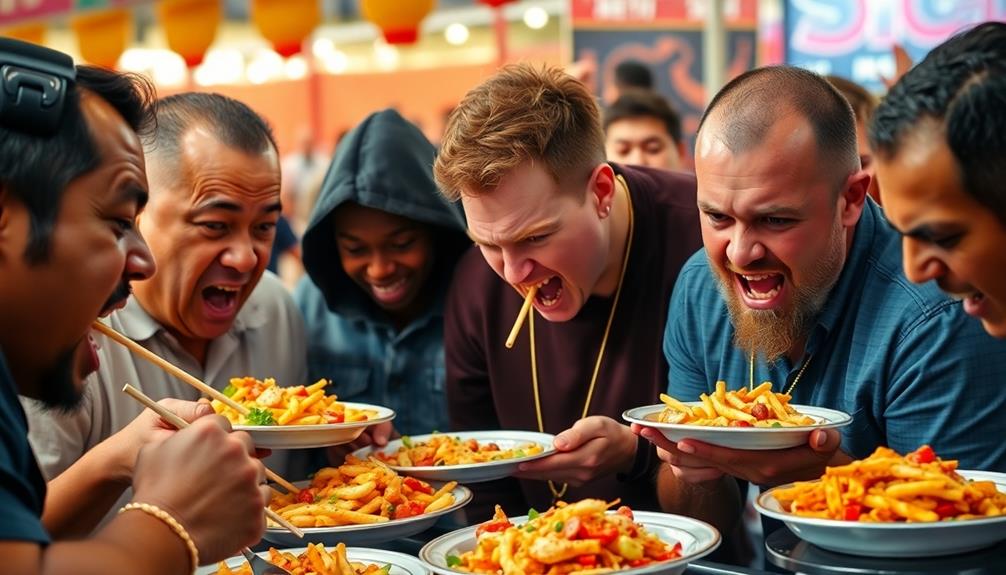
When you compete in eating contests, the pressure to perform can feel overwhelming, pushing you to your limits.
This experience is somewhat akin to the excitement and anticipation of preparing festive treats like Graveyard Taco Dip, where presentation and creativity play a key role.
To cope, you might develop mental resilience strategies that help you stay focused and adaptable under intense scrutiny.
However, it's important to recognize the emotional toll that such competitions can take, leaving you to navigate discomfort and the highs and lows that come with each challenge.
Pressure to Perform
There's a unique intensity in competitive eating that can elevate both the excitement and the pressure to perform. As you step into the competitive arena, the stakes are high, and the stress can be overwhelming. Many competitive eaters thrive under this pressure, using their nerves to boost their performance.
This pressure may mirror the experience of preparing rich dishes like Mushroom Masala, where the right blend of spices is vital for success. It's a skill honed through mental preparation and conditioning, enabling you to channel that stress into focus and drive.
However, the psychological effects of competition can be a double-edged sword. While some embrace the thrill of competition, others may face anxiety and a compulsion to eat rapidly, which can lead to discomfort after consuming excessive calories.
Maintaining ideal arousal levels becomes vital for top competitors; it's often the difference between elite eaters and amateurs. The pressure to perform can push you to your limits, amplifying not just the physical challenge but the mental toll as well.
Understanding how to manage this pressure is key, as it shapes your experience and outcomes in the world of competitive eating. Embracing the psychological aspects of competition can ultimately lead to improved performance and a deeper appreciation for the sport.
Mental Resilience Strategies
While the thrill of competition can be exhilarating, developing mental resilience strategies is essential for success in competitive eating. You'll find that techniques like visualization and positive self-talk can greatly enhance your focus and performance when the pressure is on. Stress management practices, such as controlled breathing and mindfulness, help you maintain ideal arousal levels during high-stakes contests.
Here's a quick overview of some effective strategies:
| Strategy | Description |
|---|---|
| Visualization | Picture yourself succeeding in the competition. |
| Positive Self-Talk | Use affirmations to boost your confidence. |
| Controlled Breathing | Practice deep breathing to reduce anxiety. |
| Mindfulness | Stay present to avoid distractions during events. |
| Psychological Training | Simulate competitive scenarios to build coping skills. |
Emotional Toll of Competition
Competing in eating contests can take a significant emotional toll on participants. The extreme calorie intake often leads to physical discomfort and emotional distress, leaving you feeling nauseous and regretful. This intense experience can heighten anxiety levels, pushing you to seek out sports psychology techniques to manage those nerves and enhance your performance.
Additionally, the pressure to consume large quantities can lead to an unhealthy relationship with food, similar to how traditional Brazilian dishes like Caldeirada showcase rich flavors but can also overwhelm the senses when consumed in excess.
As you become more immersed in the competition, the emotional attachment to winning can morph into addictive behaviors, where the thrill of rapid consumption overshadows any potential health risks. The cheering crowds at these events can create a temporary escape from daily life, but they also amplify the psychological effects of competition.
Over time, you might find yourself developing a complex relationship with food. Your training and competition experiences can distort your natural hunger signals, disrupting your satiety reflex and leading to long-term issues with emotional eating.
It's vital to recognize these patterns, as the emotional toll can linger well beyond the competition, affecting your overall well-being and relationship with food.
Societal Views on Eating Excess

Society often revels in the spectacle of competitive eating, transforming what was once a private act of nourishment into a public performance that challenges conventional norms. This cultural phenomenon not only entertains but also raises questions about our views on excess and consumption. As you witness these events, consider how they relate to broader societal beliefs:
- Normalization of Unhealthy Behaviors: Competitive eating glamorizes excessive consumption, framing it as entertainment rather than a health risk. This mirrors trends in certain Southern comfort foods, like fried pork chops, which are celebrated for their indulgence and rich flavors, often overshadowing their nutritional drawbacks.
- Shift in Dietary Values: Public perception now prioritizes speed and quantity, often overshadowing the importance of moderation and nutritional balance.
- Cultural Fascination with Excess: Eating contests become social bonding experiences, celebrating the ability to consume large amounts of food in a communal setting.
- Ethical Concerns: Critics highlight the stark contrast between these events and global food scarcity, questioning the morality of wasting resources that could alleviate hunger.
As you engage with this spectacle, reflect on how it influences your own views on health and consumption. Competitive eating might be thrilling to watch, but it also challenges us to reevaluate our relationship with food in a society that often embraces excess.
Health Risks and Psychological Impact
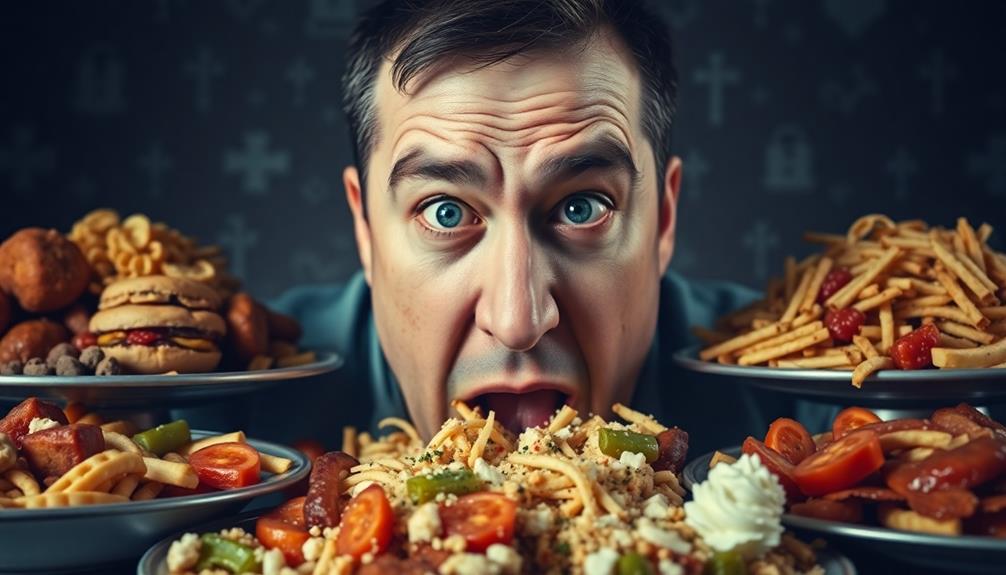
The allure of competitive eating masks significant health risks and psychological challenges that participants face. Engaging in this extreme sport often leads to chronic overeating, which can cause serious conditions like gastroparesis. This disorder results in nausea and vomiting, stemming from stomach dysfunction. You might find that the thrill of competition clouds your judgment, making it difficult to recognize when you're full, which can contribute to long-term eating disorders.
Additionally, the cultural significance of food, such as in Ethiopian cuisine, often highlights the communal and celebratory aspects of eating, contrasting sharply with the solitary nature of competitive eating.
The psychological impact doesn't stop there; after competitions, many participants experience discomfort and emotional distress due to their extreme calorie intake. This intense relationship with food can create an addiction-like response, where you seek the rush of performance despite knowing the toll it takes on your body and mind. This cycle of indulgence and deprivation can lead to an unhealthy fixation on food, further intensifying the psychological impact of fasting often employed to counterbalance periods of overeating. The constant shift between extremes places immense pressure on mental well-being, fostering feelings of guilt, shame, and anxiety. Over time, this volatile approach to nutrition can disrupt an individual’s relationship with food and perpetuate a harmful cycle of self-punishment and reward.
The high-pressure environment of eating contests glamorizes unhealthy eating behaviors, influencing both spectators and competitors.
Ultimately, these factors combine to present a complex struggle, as the pursuit of competitive eating can lead to lasting health complications and a detrimental impact on mental well-being. Acknowledging these risks is vital for anyone considering entering this world.
Coping Mechanisms Among Competitors
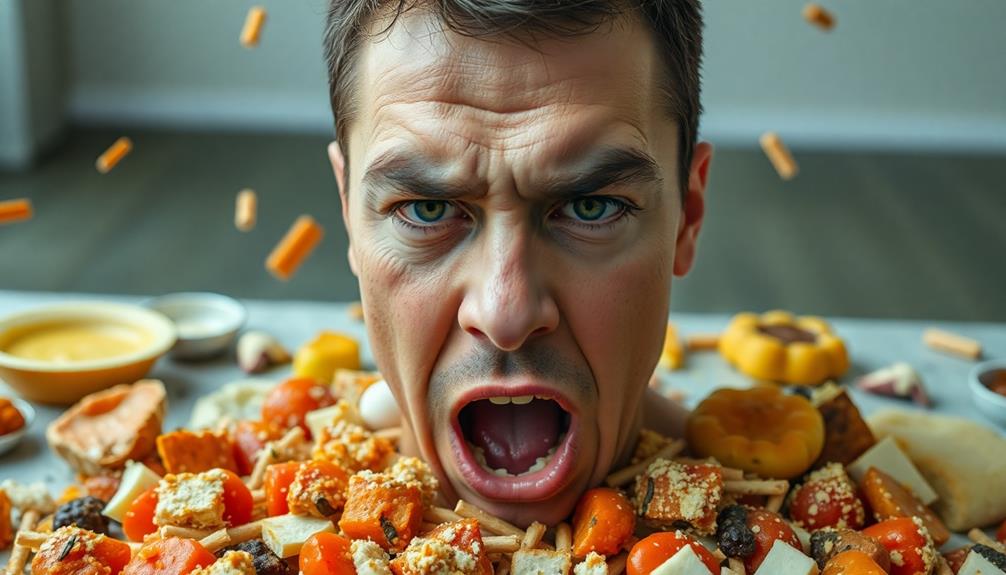
Coping mechanisms play an essential role for competitive eaters as they navigate the emotional and physical demands of high-stakes contests.
Just as those preparing festive snacks may opt for creative presentations, competitive eaters often rely on several techniques that help them override natural fullness signals while enhancing performance.
To thrive, you'll likely rely on several techniques that help you override natural fullness signals while enhancing performance. Here are four key coping mechanisms that many eaters train with:
- Fasting and Cleansing: Preparing physically and mentally through fasting helps you manage discomfort during competitions, much like how layered dessert options provide a healthy alternative to excessive sugary treats.
- Channeling Nervous Energy: Embracing the thrill of competition allows you to convert anxiety into motivation, much like Joey Chestnut does, optimizing your speed or quantity.
- Psychological Strategies: Viewing eating challenges as engineering problems enables you to adapt your techniques, improving efficiency and performance.
- Building Resilience: Accepting the discomfort post-competition fosters resilience, allowing you to cope with the physical toll that extreme eating can take on your body.
The Future of Competitive Eating
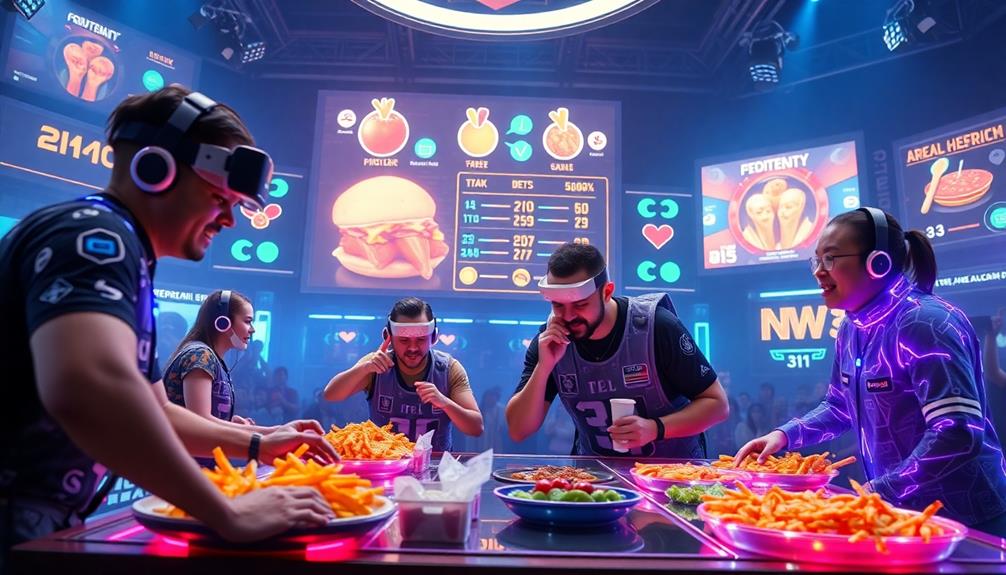
As competitive eaters refine their coping mechanisms, they also face an evolving landscape that could reshape the sport. The increasing awareness of health risks associated with extreme consumption practices may drive stricter regulations. This shift could lead to competitions that prioritize balanced diets over sheer calorie quantity, influenced by advances in nutritional science.
The table below illustrates the potential changes in competitive eating:
| Current Practices | Future Trends |
|---|---|
| Focus on quantity | Emphasis on nutrition |
| Minimal health monitoring | Thorough health oversight |
| Traditional formats | Innovative, health-oriented events |
| Limited social engagement | Robust presence on social media |
The rise of social media and streaming platforms could enhance visibility, attracting new audiences and promoting responsible eating habits. Additionally, genetic research into the traits of competitive eaters may inform training techniques and health management strategies, fostering safer participation. As societal attitudes shift towards health and wellness, competitive eating will need to adapt its formats to remain appealing and relevant in this changing environment.
Frequently Asked Questions
What Is the Science Behind Competitive Eating?
The science behind competitive eating involves physiological adaptations like an expandable stomach and minimal fullness signals. Training enhances jaw strength and swallowing efficiency, allowing you to consume food rapidly, much like a predator in action.
What Is the Psychology Behind Competitiveness?
Competitiveness drives you like a thousand wild horses, pushing you to excel. It sparks adrenaline, ignites passion, and fuels determination. You thrive on challenges, embracing pressure, and constantly endeavoring to surpass your limits and achieve greatness.
Why Are so Many Competitive Eaters Skinny?
Competitive eaters often appear skinny because they balance their intense calorie consumption with rigorous training, fasting, and healthy diets outside of competitions. Their bodies adapt, allowing them to eat large amounts without significant weight gain.
How Do Competitive Eaters Eat so Quickly?
Competitive eaters eat quickly by using specific chewing and swallowing techniques, training to expand their stomachs, and employing methods like jumping up and down to maximize capacity. Their practice allows them to consume enormous quantities efficiently.
Conclusion
In competitive eating, it's fascinating to note that the average contestant can consume over 10,000 calories in just a few minutes! This staggering number highlights not just the physical feats involved but also the intense psychological drive behind this sport. As you've seen, the motivations, training techniques, and societal perceptions shape the world of competitive eating. Understanding these aspects not only deepens your appreciation for the sport but also sheds light on the complex relationship between food and behavior.


